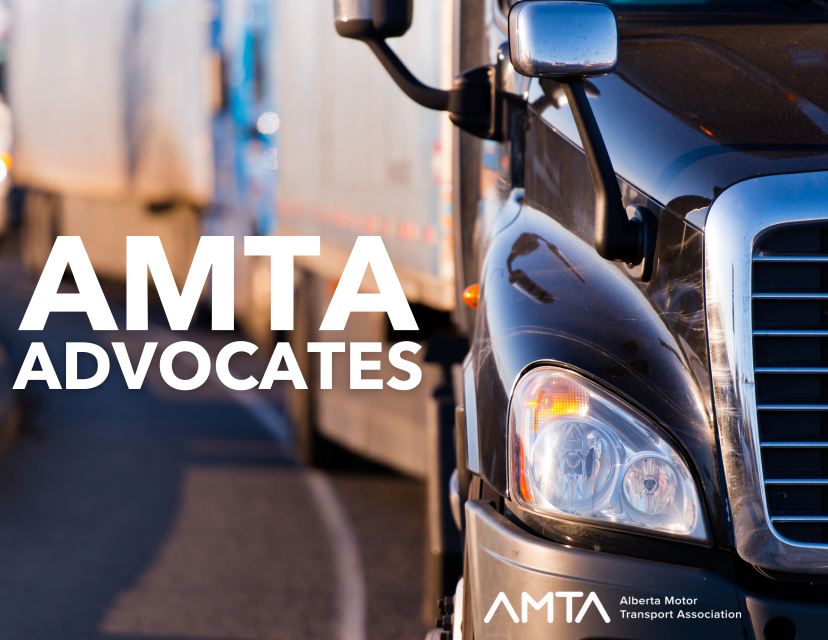Advocacy
AMTA Advocacy plays a critical role in supporting Alberta’s commercial transportation sector. The Alberta Motor Transport Association works with industry leaders, carrier members, and policymakers to develop solutions to transportation challenges and advocate for policies that drive safety, innovation, and long-term success.

myAMTA Carrier Member Network
On the myAMTA Carrier Member Network you can receive valuable advocacy updates and resources, discover and chat with other carrier members and AMTA’s advisors at your convenience, fostering valuable relationships that complement your in-person interactions. Stay informed with real-time industry and regulatory updates, ensuring you are always ahead of the curve.
Our positions are developed in response to the problems, challenges and opportunities that are impacting our members. Through participation on committees, responding to member surveys, or just by contacting us, members play a vital role in strengthening AMTA’s voice.
Advocating for your success
AMTA, supported by carrier members’ annual fees, champions road transportation on local and global stages. We work hand in hand with fleet leaders to tackle transportation challenges.
Our programs aid Alberta member companies, advocating for fleet issues and raising awareness among stakeholders and the public about their broader significance.
We address a spectrum of concerns—environmental, social, economic, safety, and compliance—affecting Alberta fleets. Collaborating closely with the Canadian Trucking Alliance for national issues and partnering with the Canadian Motor Coach Association, we support the motor coach industry. Our policies are shaped by the member-driven Compliance and Regulatory (CRA) committee working alongside AMTA staff.

“The AMTA has granted our organization advanced opportunities to stay ahead of legislative changes, industry trends and various economic forecasting.”
– AMTA Carrier Member
Recent Advocacy Highlights
November 10, 2023 - Cargo Securement Policy
A policy position developed in 2015 around Cargo Securement stated that when a Cargo Van or Container has a customs seal which can not be opened by a drivers, the driver should not be held responsible for the cargo securement of that load. Should the Commercial Vehicle Safety Alliance (CVSA) pursue policy changes that would move the violation from the driver or motor carrier to the shipper when the load has been pre-sealed by the shipper and is found to have blocking and bracing issues.
June 17, 2023 - Oilfield Exemption Permit
The AMTA Oilfield committee received notice and overview of the changes to the permit conditions on the Oilfield exemption permit which when finalized will allow for less restrictive movement of Oilfield equipment around Alberta. This win is critical to ensure that our members do not violate the HOS rules its extremely difficult to switch between permissible hours and cycle as it takes 72 hours of off duty time.
June 15, 2023 - Prorate Processing
AMTA-CRA-PP-11-2020 was closed after months of working with Prorate manager and the Executive Director were successful in reducing the wait time down to 5 days which was deemed acceptable.
July 14, 2022 - Grande Prairie Truck Routes
The County of Grande Prairie has been advocating for the development of the Hwy 40X SW connector from the Bypass down to highway 40.
May 28, 2021 - Twinning Highway 40
The work to twin a 19-kilometre stretch of Highway 40 south of Grande Prairie is well underway. AMTA-CRA-PP-28-18 HIGHWAY 40WAPITI BRIDGE TWINNING
January 4, 2021 - Red Tape Reduction Permits
1. Heavy Duty Bumpers and Aerodynamic Devices – Exclude heavy duty bumpers and devices from measurement of overall length, as long as they do not extend more than 30 cm beyond the front of trucks or truck tractors (except for B-train configurations).
2. B-Train Length – Increased the maximum overall length for B-trains, including any load from 25.0 metres to 27.5 metres
3. Tridrive Exemption – Tridem drive axle group and tridem drive truck tractor configurations are now included in the regulation.
4. Long Wheelbase Tractor – Increase wheelbase for tractors allowed provided there is a corresponding decrease to the trailer wheelbase.
5. Auto Carriers – Allows increased dimensions on vehicles that haul multiple vehicles or boats to operate.
6. Divided Record Authority – Remove requirement for carriers to keep records at their principal place of business. Carriers must still produce all records upon request of a peace officer within 14 days.
7. Bed/Picker/ Winch Sleeper – Amends regulatory definitions to allow bed trucks, picker trucks, and winch trucks equipped with sleepers to operate on both provincial and municipal roads. AMTA-CRA-PP-23-18 Tridem Drive Steer Axles
8. Oilfield Steer Axle – Allows bed trucks, picker trucks, and winch trucks with a heavier steering axle to operate. AMTA-CRA-PP-23-18 Tridem Drive Steer Axles
9. TAC Equipment – Allows a commercial vehicle with a tridem axle group to operate on municipal roads at the same maximum weights that are allowed on provincial roads.
10. Wide Base Single Tires – Allows trucks (other than tridem drives) and trailers to use wider, single tires, instead of dual tires on provincial and municipal roads. These tires will be allowed to carry equivalent weights of dual tires. AMTA-CRA-PP-05-2015 – Wide Based Single Tires
11. Hitch Offset – Allows commercial vehicles hauling light trailers or RVs to have a longer hitch offset

Interested in learning more about AMTA’s advocacy efforts?
AMTA Advocates serves to shed light to the efforts the Alberta Motor Transport Association makes behind the scenes to advocate on behalf of our Carrier members. Read our AMTA Advocates blog.
